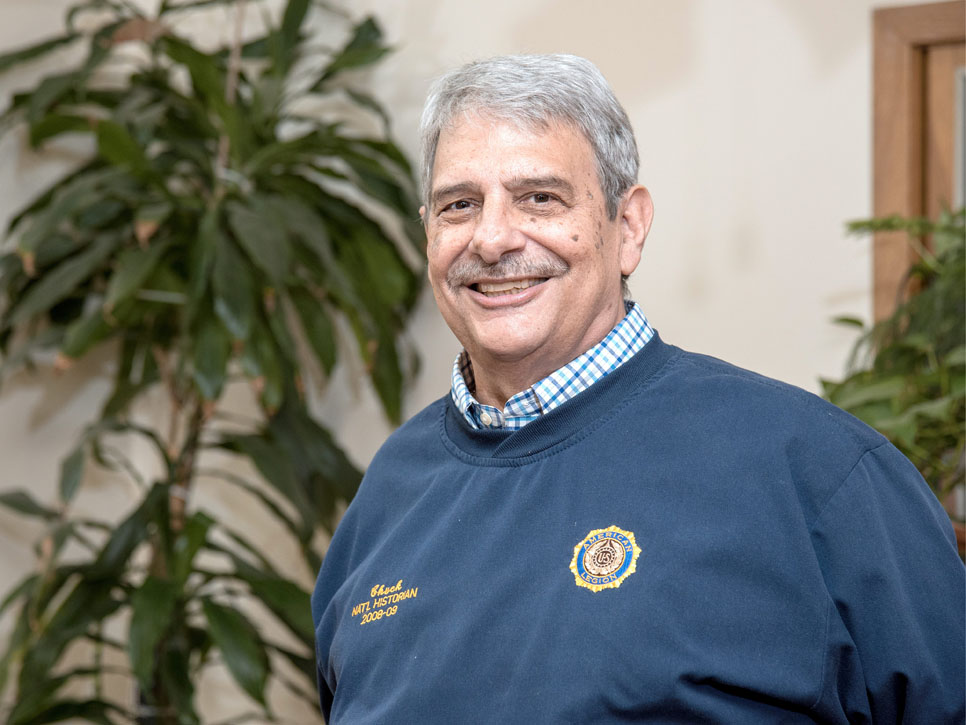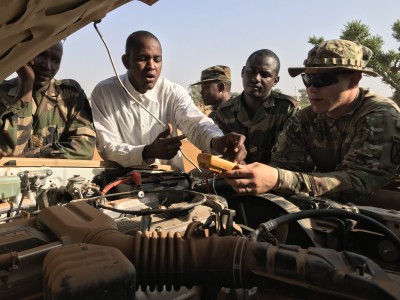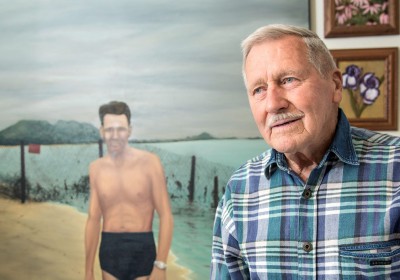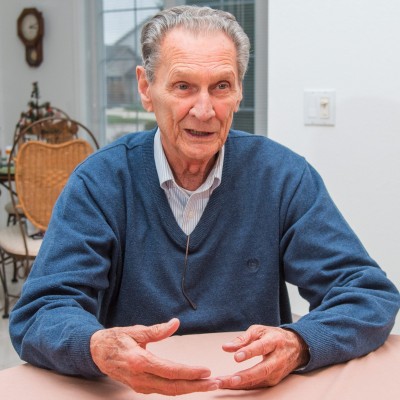Chuck Zelinsky
By Paul Wood

Photo By Rick Danzl/The News-Gazette
CHAMPAIGN — Chuck Zelinsky served on the Air Force base where President John Kennedy often made stops. On one of them, he saluted Kennedy, and Kennedy saluted back.
“Eight weeks later, he was assassinated,” Zelinsky recalls.
“The base went into high alert,” he adds, with Americans not sure what the assassination would mean in ever-tense global politics.
At 17, in 1961, the Connecticut native joined the Air Force, making him a Cold Warrior.
It was the time of the 1961 Berlin Crisis and the 1962 Cuban Missile Crisis, and the Vietnam War — an interesting seven years to serve.
Zelinsky enlisted right out of high school, but he graduated from the “University of Chanute” after two sessions there.
Retired from the University of Illinois now at 73, he is active in the American Legion, having served as national historian and two terms as state historian. He’s an expert on the American flag.
Zelinsky served at Otis Air Force Base, where Strategic Air Command bombers had a refueling station, ready for a potential nuclear face-off with the then-powerful Soviet Union.
“Those pilots lived out of their suitcases,” Zelinsky recalls. He was in fuel maintenance.
The base also served the 33rd Fighter Wing, the 4604th Support Squadron, the 60th Fighter-Interceptor Squadron and the 551st Airborne Early Warning and Control Wing aircraft.
Zelinsky remembers the base’s crew working with the Lockheed EC-121, an airborne early warning and control radar surveillance aircraft.
And Zelinsky clearly remembers the First Family.
Otis Air Force Base, now a National Guard base, is on the western portion of Cape Cod, Mass.
That made it the closest base to the Kennedy family’s compound at Hyannis Port, and the natural place for Air Force One to land — with a no-fly zone around Otis, he says.
From the Air Force Base, the president, the first lady and their two children flew by helicopter to Hyannis Port.
Air Force Two was not as grand, Zelinsky says; it carried secondary aides and the press, who had to drive to the family compound.
Zelinsky remembers the excitement and then the sadness when Jacqueline Kennedy gave birth to their son prematurely at the Otis Air Force Base Hospital.
Patrick Bouvier Kennedy died two days later, he remembers.
“There were a lot of very sad people on the base,” he says. “We knew that it had been a difficult pregnancy.”
It was an intense time in many ways, with the world fearing a nuclear exchange, and security was tight around the Kennedys.
In 1961, the Berlin Crisis reached a peak after the USSR delivered an ultimatum to force the withdrawal of Western armed forces from West Berlin.
It ended with the erection of the Berlin Wall, splitting Berlin and preventing defection to the free world.
The Bay of Pigs failed invasion of Cuba also took place in 1961.
In October 1962, the Cold War was at its most frigid, with forces led by the United States placing nuclear-tipped Jupiter ballistic missiles in Italy and Turkey. Soviet leader Nikita Khrushchev and Cuba’s Fidel Castro, who died last week, planned a retaliation.
“The president flew into Hyannis Port around the time of the Cuban Missile Crisis,” Zelinsky recalls, sometimes weekends in a row.
In intense meetings, the commander in chief and brother Bobby worked with advisers to stop the Soviets and their plans for missiles in Cuba, 90 miles from Florida.
Khrushchev backed down, and the Cold War never again saw that level of tension.
Zelinsky was a master at fixing what was high tech at the time. When the Canadian prime minister visited, his plane wouldn’t take off. It was an electrical problem, and the crew had to work with its external starter — but didn’t have the adapter needed.
With 11 months to go, Zelinsky was transferred to France’s Laon Base.
Later, he became an instructor. “I made a deal that got me to Chanute,” he says.
But he also traveled for the Air Force, as far as the Philippines.
He married a local girl, Pam, who came from Bondville. She looked forward to a life outside the military. They’re still together, and raised a family.
Zelinsky left the Air Force, and eventually found himself at the Illinois Geological Survey, where he worked for 28 years.
Retirement gave him more time for the American Legion, a large part of his life.
Do you know a veteran who could share a story about military service? Contact staff writer Paul Wood at pwood@news-gazette.com.
Read more stories from local veterans:
 Seth Carroll
NIAMEY, NIGER — After serving in Bahrain and Turkey, Sgt. Seth Carroll has equipment stored and ready for any mission th …
Seth Carroll
NIAMEY, NIGER — After serving in Bahrain and Turkey, Sgt. Seth Carroll has equipment stored and ready for any mission th …
 Franklin Longfellow
CHAMPAIGN — When Franklin “Frank” Longfellow returned from Vietnam, his entire welcoming party was two students from Cen …
Franklin Longfellow
CHAMPAIGN — When Franklin “Frank” Longfellow returned from Vietnam, his entire welcoming party was two students from Cen …
 Melvin Parker
CHAMPAIGN — Melvin Parker joined the Army right after World War II, when it looked like there might be war with the Sovi …
Melvin Parker
CHAMPAIGN — Melvin Parker joined the Army right after World War II, when it looked like there might be war with the Sovi …